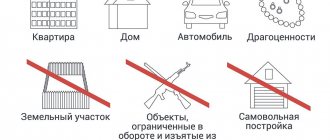The owner of any property assets is guaranteed by law full legal protection from attacks by third parties. This also applies to cases of illegal retention or appropriation of someone else’s property, when the copyright holder is deprived not only of the opportunity to dispose of his property, but also of actually possessing it. In our article we will learn what is considered as illegal seizure and retention of someone else’s property, as well as the composition of possible penalties for the offender.
The concept and signs of theft of other people's property
Appropriation is the illegal conversion of someone else's property to one's own benefit, committed for selfish purposes and free of charge. It should also be taken into account that appropriation is established only in cases where its legal owner has objected or objects to such actions. If the owner knowingly transferred his assets free of charge to another person and does not object to the withholding, there will be no penalty for misappropriation.
The illegality of these actions is as follows:
- there is no agreement or other document defining the obligations between the parties, according to which the violator legally receives the property, can use it and turn it to his advantage (for example, in the process of rental relations formalized in the form of an agreement, the transfer of property occurs on a legal basis);
- termination of legal grounds for ownership of someone else’s property - expiration of the contract, early termination of contractual relations, etc.;
- absence of direct permission of the proper owner to retain property by another person (with the exception of cases when retention is expressly permitted by law for security purposes).
Note!
Article 359 of the Civil Code of the Russian Federation indicates that the retention of other people's things or objects will be completely legal if this occurs in the presence of a debt to the person withholding. At the same time, the conditions for actually receiving the thing are important - this must happen legally.
You are advised by the best qualified lawyers
Free: Our lawyers provide free initial consultation on any legal issues. 90% of cases are resolved with one free consultation.
24/7: real estate via online chat, or call the hotline 24 hours a day, 7 days a week
If any item or object was transferred during the period of the loan agreement as collateral to secure obligations, the creditor not only has the right to retain the thing until full settlement, but can also foreclose to fully repay the debt. Such rules must be specified in detail in the contract or follow from the law.
If an item was obtained illegally, then it may be a case of theft, robbery or another type of theft. For such illegal acquisition and subsequent appropriation of someone else's property, articles of the Criminal Code of the Russian Federation are applied (for example, under Article 158 of the Criminal Code of the Russian Federation).
The article for appropriation of someone else's property is also present in the Criminal Code of the Russian Federation; it applies to cases where the guilty person tried to turn the entrusted property to his own benefit, i.e. transferred on a legal basis. Article 160 of the Criminal Code of the Russian Federation contains penalties not only for the appropriation of someone else's property, but also for its embezzlement, i.e. consumption, expenditure or disposal. When the trustee was obliged, on behalf of the owner, to deposit a certain amount into a pre-specified bank account, violation of such an order and misappropriation of entrusted money will also be punishable under Art. 160 of the Criminal Code of the Russian Federation.
Criminal liability for misappropriation occurs in the presence of the following circumstances:
- the size of the assigned assets will only matter for the division of responsibility between different parts of Art. 160 of the Criminal Code of the Russian Federation, and according to Part 1, the amount of stolen funds or the value of the property does not matter at all;
- the guilty person must commit the crime with direct intent. If, for objective reasons, the return of property was impossible, and the detaining person stored it for subsequent transfer to the proper owner, punishment under the Criminal Code of the Russian Federation will not follow;
- in the actions of the criminal, the nature of the gratuitous appropriation must be established. If a redemption price is paid for the transferred property, but it does not correspond to market or other indicators, we will be talking about a civil dispute and not a criminal case.
In addition to the appropriation of someone else's property, Art. 330 of the Criminal Code of the Russian Federation, which contains punishment for arbitrariness. This illegal behavior consists of committing actions, the legality of which is disputed by a citizen or legal entity. A typical case of arbitrariness is a ban or other restrictive measures for the use of property by the proper owner. In this case, the property is not converted to one’s own benefit on a mercenary basis, but the owner is deprived of the opportunity to fully realize his rights.
When property is considered legally retained
It is possible to retain an item if the debtor has violated an obligation, for example, failed to pay for the item within the period established by the contract. There are no restrictions for relationships that arise from entrepreneurship; you can use this measure of security for any obligations.
The conditions for legal retention are as follows:
- The thing must belong to the debtor.
- The creditor must take legal possession of the item, for example, if a contractor repaired a car and the customer does not pay for the repairs. Another example is that the tenant does not pay rent and has not removed things from the apartment.
- The right of lien must be provided for by law or contract.
- The creditor must retain the retained item and does not have the right to dispose of it.
If the retention is illegal, then the debtor can claim the thing through the court and recover damages.
Differences
Appropriation is considered as one of the options for theft of property that does not belong to the offender. Other offenses include theft, fraud, robbery, etc. The key differences between the various types of property crimes aimed at taking someone else's money or property are as follows:
- a basic sign of misappropriation or embezzlement of someone else’s property under Art. 160 of the Criminal Code of the Russian Federation is illegal actions with entrusted assets or money, i.e. the criminal initially received them on a legal basis by the direct will of the owner;
- theft implies the secret seizure of property, in which the proper owner not only does not consent to such an action, but in most cases does not even know about it;
- robbery consists of open theft, when the owner of money or assets is forced to part with property under the threat of violence, the use of weapons or other types of illegal behavior;
- robbery is a direct attack on the owner of property, committed with the aim of stealing and converting other people's money or assets into one's own property;
- Fraud means the illegal taking of other people's money, things or objects under the influence of deception, abuse of trust and other actions not related to violence.
Note!
The distinction and distinction between various types of theft is established not only according to the norms of the Criminal Code of the Russian Federation, but also according to the guiding clarifications of the Supreme Court of the Russian Federation. In particular, the appropriation of someone else's property is also disclosed in the provisions of judicial practice - Resolution of the Plenum of the Armed Forces of the Russian Federation dated December 27, 2007 No. 51 distinguishes between appropriation, embezzlement and fraud.
The law on appropriation of someone else's property also provides for enforcement measures under the Civil Code of the Russian Federation, since the owner has the right to demand the return of things or money from the illegal possession of other persons. To do this, a statement of claim may be filed in the district court, and when considering a criminal case, a claim may be filed, including for damages.
Thus, determining the following circumstances will be of key importance when investigating misappropriation cases:
- whether the property came into the possession of the offender legally;
- whether violence, threat, deception or other illegal actions were used against the owner, the purpose of which was to seize other people’s things or finances;
- whether the retention was unlawful;
- whether the offender had selfish motives.
Sale of someone else's property for selfish purposes Art. 160 of the Criminal Code of the Russian Federation is considered embezzlement. Personal consumption of entrusted property (for example, food products), as well as spending money on one’s own needs, is also considered a crime.
Article 160 of the Criminal Code of the Russian Federation on the illegal appropriation of someone else’s property provides for the following types of punitive sanctions:
- under part 1 - a fine of up to 120 thousand rubles; compulsory, correctional or compulsory work; imprisonment for up to two years;
- under Part 2 (if a preliminary conspiracy is established, or significant damage is caused) - similar penalties, and imprisonment can be up to five years;
- under Part 3 with major damage may be punishable by up to six years;
- Part 4 (especially large scale, or participation in an organized group) - imprisonment can be up to 10 years.
To bring to justice under Art. 160 of the Criminal Code of the Russian Federation does not matter what assets ended up in the hands of the criminal, however, determining the amount of the stolen property may differ significantly depending on the type of property.
Legislation on unlawful detainment of someone else's property
There is no separate provision of law containing the offense of unlawfully retaining someone else’s property and the punishment for this. However, actions to delay a thing and prevent access to it by the rightful owner appear in different legislative acts in different guises.
- Such actions can be classified as a crime according to the provisions of the Criminal Code (Article 330 - arbitrariness, Art. 160 - misappropriation and embezzlement).
- Such actions can be regarded as an administrative offense according to the norms of the Code of Administrative Offenses of the Russian Federation (Article 19.1).
- Civil legislation aims not to punish, but to return, and therefore contains rules that allow you to claim your property from someone else’s illegal possession (Article 301 of the Civil Code of the Russian Federation).
- Judicial practice concerning the consideration of certain offenses in the form of retention of someone else's property is systematized in the resolution of the plenum of the Supreme Court “On judicial practice in cases of fraud, misappropriation and embezzlement” dated December 27, 2007 No. 51.
What can be subject to appropriation?
As part of bringing to responsibility for any forms of theft, including misappropriation and embezzlement under Art. 160 of the Criminal Code of the Russian Federation, the following objects are considered as property:
- money in rubles or other foreign currency;
- things, objects and other material products;
- real estate objects or rights to them;
- securities, including in non-documentary form;
- other types of property for which ownership belonged to another person.
The amount of funds appropriated, which will affect the division of responsibility for different parts of Art. 160 of the Criminal Code of the Russian Federation coincide with similar criteria for other types of theft. They are listed in the notes to Art. 158 of the Criminal Code of the Russian Federation. A large size must exceed 250 thousand rubles, and a particularly large one - 1 million rubles.
If a case of embezzlement of funds is being investigated, determining the amount of the stolen money will not be difficult. If the object of the theft were any things, objects or other material assets, their value will be determined during the investigation of the case by assigning various types of examinations.
If you are facing criminal prosecution for illegal retention of someone else's property, contact our lawyers who have extensive practice in handling such cases. Call us at the numbers listed on the website or ask your question online.
What is unlawful detainment of property
According to Ozhegov’s explanatory dictionary, to retain means to preserve, to save, not to let go, not to give away, not to allow something to be revealed.
Illegal retention is the retention of a thing contrary to the law, without any reason. Thus, the retention may be legal or illegal. If you simply take an item from the owner and do not give it back, it is illegal. An example of a legal lien would be a lien in civil law. The creditor legally holds the property of the debtor until the latter pays his debt for this thing or debt. A striking example of such a technique would be the landlord’s actions of not returning the tenant’s belongings due to the latter’s rent arrears.
How to distinguish illegal retention of someone else's property from legal one?
- The measures will be legal if the thing is in the possession of the person holding it on legal grounds (in accordance with the contract or by virtue of the law).
- To recognize retention actions as legal, there must be a debt or obligation on the part of the owner of the thing to the one who is retaining it.
However, in any case, it is important to remember that the line between legal retention actions and an offense is quite thin. Therefore, you need to be confident in the legality of your actions so as not to become involved in a criminal case. We’ll talk about how to distinguish legal from illegal retention below.







